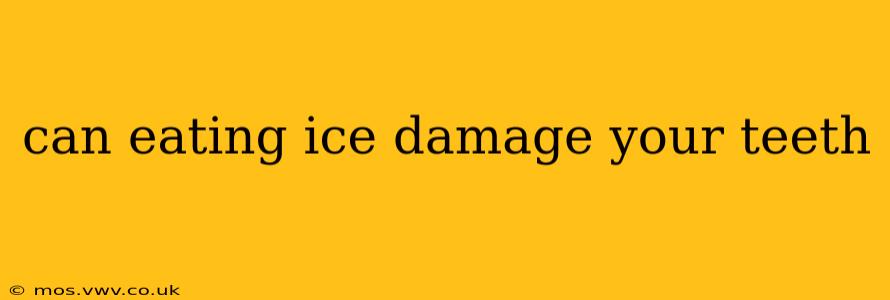Many of us enjoy the refreshing crunch of ice, especially on a hot day. But is this seemingly harmless habit actually damaging our teeth? The short answer is: yes, it can. While the occasional ice cube probably won't cause significant harm, regular consumption of ice can lead to several dental problems. Let's delve into the details.
What Happens When You Chew Ice?
The hard, brittle nature of ice presents a significant challenge to your tooth enamel, the protective outer layer of your teeth. When you bite down on ice, the force can cause:
- Fractures and Chips: The pressure exerted on your teeth can lead to tiny cracks or even larger chips in your enamel. These fractures, often invisible to the naked eye, can weaken your teeth and make them more susceptible to cavities and decay.
- Enamel Erosion: Repeated chewing of ice can gradually wear away your enamel, leaving your teeth more vulnerable to temperature changes, acids, and bacteria. This can lead to increased sensitivity and an increased risk of cavities.
- Cracked Teeth: In more severe cases, the force of chewing ice can lead to cracked teeth, requiring extensive dental work, including root canals or even extractions.
How Much Ice is Too Much?
There's no magic number of ice cubes that define "too much." The risk depends on several factors, including:
- The Hardness of the Ice: Harder ice, like that from a freezer tray, poses a greater risk than softer ice, such as crushed ice.
- The Force of Your Bite: People who habitually chew ice with significant force are at a higher risk of damage.
- The Frequency of Ice Consumption: Daily ice consumption is far more risky than occasional indulgence.
Is It Just Ice? What About Other Hard Foods?
While ice is particularly problematic due to its hardness and brittle nature, other hard foods can also damage your teeth. Hard candies, nuts, and even some types of popcorn can contribute to enamel wear and chipping. It's crucial to be mindful of the hardness of the food you consume and to avoid excessive force when chewing.
What are the Signs of Ice-Induced Tooth Damage?
The damage from chewing ice isn't always immediately apparent. However, some common signs to watch out for include:
- Increased Tooth Sensitivity: Experiencing pain or discomfort when consuming hot or cold foods or drinks.
- Visible Cracks or Chips: Noticeable damage to the surface of your teeth.
- Discoloration: Darkening or staining of your teeth.
- Pain When Biting Down: Discomfort when chewing or applying pressure to your teeth.
How Can I Protect My Teeth from Ice Damage?
If you enjoy ice, it's best to practice moderation. Consider these tips:
- Limit Your Ice Consumption: Try to minimize the amount of ice you consume each day.
- Choose Crushed Ice: Crushed ice is less likely to cause damage than larger ice cubes.
- Avoid Chewing Ice: Instead of chewing, let the ice melt in your mouth.
- Regular Dental Checkups: Regular visits to your dentist for checkups and cleanings are essential for early detection and treatment of any dental problems.
Can I Repair Ice-Damaged Teeth?
The good news is that many forms of ice-induced damage can be repaired. Your dentist may recommend:
- Fillings: To repair small chips or cracks.
- Crowns: To cover and protect severely damaged teeth.
- Root Canals: If the damage extends to the pulp of your tooth.
What are the long-term effects of chewing ice?
Long-term chewing of ice can lead to significant tooth damage that may require costly and extensive dental procedures. It can cause persistent sensitivity, increased risk of cavities, and eventually tooth loss.
In conclusion, while enjoying an occasional ice cube is unlikely to cause significant harm, regular and forceful consumption of ice can lead to a range of dental problems. Practicing moderation and being mindful of the potential risks is crucial for maintaining the health of your teeth. Remember, prevention is always better than cure. See your dentist regularly for optimal oral health.
